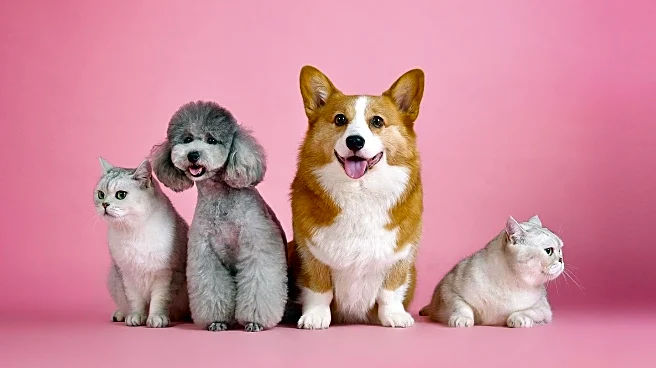What's Happening?
Brian Rowlan, a dog owner, has gained significant attention on social media with a satirical video explaining why he believes cats are 'the worst' pets. In the video, Rowlan humorously lists reasons such as cats not respecting personal space and lacking manners. However, the twist is that while he makes these claims, his dachshund, Bonnie, is seen climbing all over him, contradicting his statements. The video, shared on TikTok, has gone viral, amassing nearly 900,000 likes and 5.7 million views. Rowlan's playful approach has resonated with many pet owners, who have shared their own experiences of pets seeking close contact, including not just dogs and cats, but also chickens, rats, lizards, and snakes.
Why It's Important?
The viral nature of Rowlan's video highlights the power of social media in spreading humor and connecting pet owners worldwide. It underscores the universal appeal of pet-related content and the joy it brings to audiences. The video's success also reflects the growing trend of using satire and humor to engage viewers, which can be a powerful tool for content creators. Additionally, it showcases the strong bond between pets and their owners, a sentiment that resonates deeply with many people, potentially influencing pet adoption and care practices.
What's Next?
As the video continues to gain traction, it is likely that Rowlan will experience increased engagement on his social media platforms. This could lead to opportunities for collaborations with pet brands or other content creators. The video may also inspire other pet owners to share their own humorous pet stories, further fueling the trend of pet-related content on social media. Additionally, the positive reception of the video could encourage Rowlan to create more content in a similar vein, potentially establishing a niche audience.
Beyond the Headlines
The video's popularity also raises interesting questions about the role of pets in human lives and how they are perceived in different cultures. It highlights the cultural significance of pets as companions and the emotional support they provide. Furthermore, the humorous portrayal of pets challenges traditional views of pet behavior, encouraging a more relaxed and accepting attitude towards the quirks and antics of animals.









